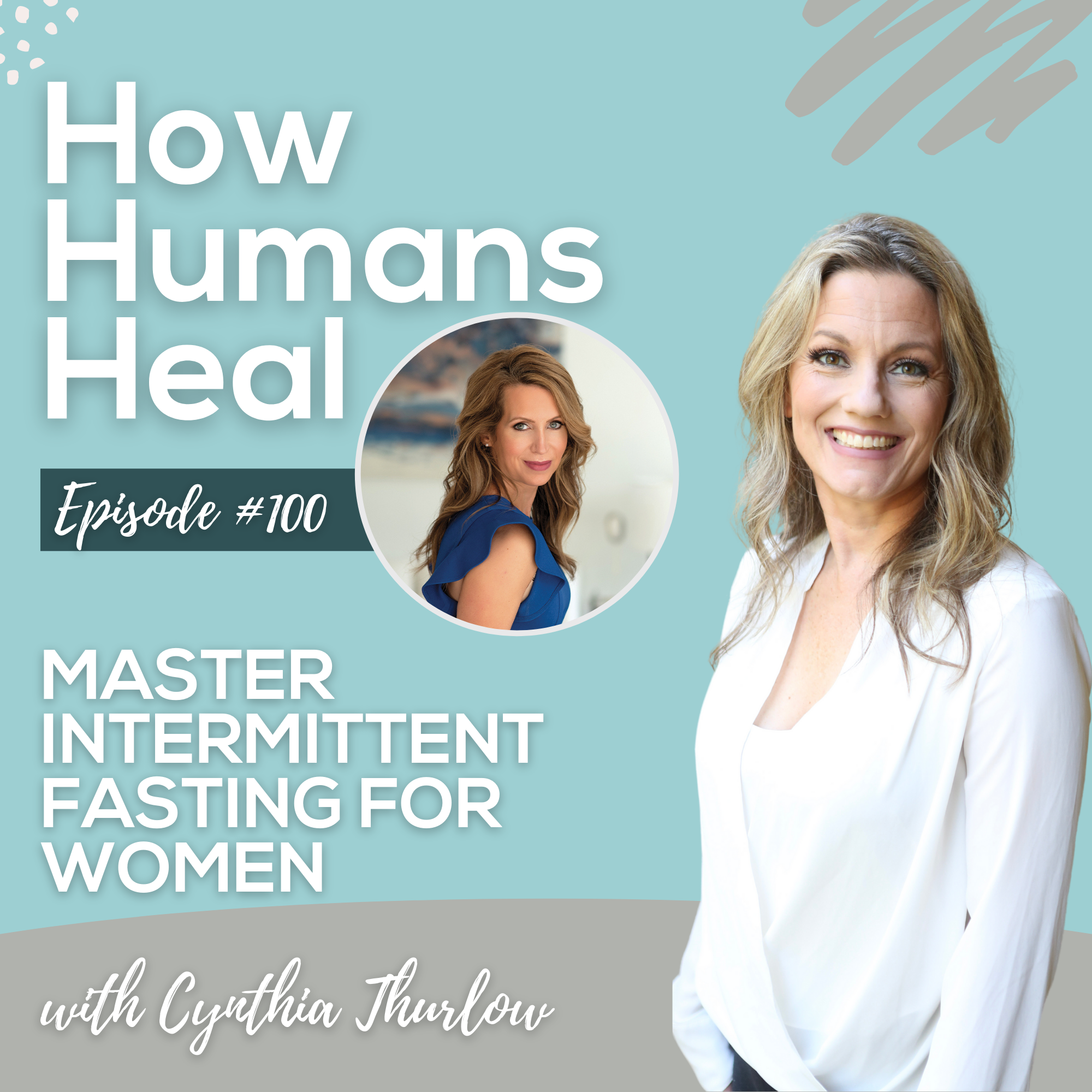

NOTICE: Sign up for my free masterclass on MTHFR – Wed March 16th @ 6 PM ET
Cynthia Thurlow [@cynthia_thurlow], nurse practitioner and CEO of Everyday Wellness Project, shares from her experience as a practitioner and woman going through perimenopause how intermittent fasting changed her life and health.
In this episode of How Humans Heal, Cynthia shares insights from her new book, Intermittent Fasting Transformation. She says that instead of being overfed, we need to be strategically fed.
Women need more options besides prescription medications and surgery. Instead of just taking another pill or hormone for a symptom. We can use food choices as powerful ways to address symptoms. By making small, sustainable changes in the way we feed ourselves, we can address inflammation, insulin resistance, cardiovascular disease, and other health issues caused by “metabolic inflexibility.”
The bulk of us are not metabolic healthy, Cynthia says.
Women are given reflux medications, anti-depressants, sleeping agents, and estrogen replacement. This creates a slippery slope and women are likely to feel wrecked by the time they hit perimenopause. In the sandwich generation, women are responsible for so much. We as women are care takers, but who is taking care of us.
“Women are not “mini men” and cannot fast the same way men do. But women can benefit from intermittent fasting when we make modifications based on our hormones.”
Cynthia ‘s goal is to influence women’s lives in a sustainable way, which is why she wrote her book. In this episode and in the book, Cynthia talks about:
- As estrogen decreases, insulin sensitivity decreases
- It shows up as fatigue, anxiety, weight gain, and menstrual irregularities
- It used to be that restricting food and exercising more would work for weight loss, but in perimenopause, that stops working
- She is not anti-carb; she encourages women to consume the right carbs
- Intermittent fasting is free and flexible
- Align food intake with chronobiology – our internal clock. Don’t eat within 3 hours of bedtime. Eat when it is light outside.
We are so focused on fertility years, and then women feel invisible and unrepresented in perimenopause, and yet we spend half of our lives in that state. Over 35 to 40 years old, indiscretions of snacking or having a glass of wine is more likely to be an issue, increasing inflammation and blood sugar levels.
We need to be eating less often and eat the way our bodies are designed to thrive. We would not be here as a species if our bodies could not go through periods of food accessibility and scarcity, and to use different types as fuel sources. Our bodies are not designed to be in a surplus of food all the time.
When you go to eat a snack, ask yourself, am I really hungry? Or am I stressed or bored and either need to take a walk or go to sleep.
Use of a continuous glucose monitor (CGM) – which is currently by prescription – is one of the most impactful things you can do. It can allow you to experiment with different foods to find out how your body responds to a certain meal. Being aware of what your blood sugar is doing can be hugely influential to understand how stress, travel, and certain foods affect you.
As hard as it can be to admit to ourselves that foods we love are an issue, when we do, it can allow us to make drastic changes in our health and wellbeing.
Listen in to the amazing conversation I had with my friend, Cynthia Thurlow, for more insights about how what you are eating, and when, could be affecting the way you feel. Find her book, Intermittent Fasting Transformation, at https://cynthiathurlow.com/
Connect with Cynthia Thurlow:
Connect with Dr. Doni:
- Facebook https://facebook.com/drdoniwilson
- Instagram https://instagram.com/drdoniwilson
- YouTube https://youtube.com/DoniWilsonND
- Newsletter: https://doctordoni.com/www (Weekly Wellness Wisdom)
- Podcast: https://doctordoni.com/podcast (How Humans Heal)
More Resources from Dr. Doni:
- Stress Type Quiz: Assess your adrenal function
https://doctordoni.com/quiz - Dr. Doni’s Book: Master Your Stress, Reset Your Health
https://doctordoni.com/book - Dr. Doni’s Facebook Group: Stress Warrior Stress Resiliency
https://facebook.com/groups/stresswarrior - HPV Recovery Guide (FREE)
https://doctordoni.com/ddpp/hpv-guide/ - FREE Masterclasses with Dr. Doni
https://doctordoni.com/masterclasses - FREE Guides from Dr. Doni
https://doctordoni.com/guides
Personalized Solutions:
- 14-Day Detox Program: You can start this transformation program anytime
https://doctordoni.com/detox-program - Say Goodbye to HPV (12-week Program): Begin the journey to freedom from HPV today!
https://doctordoni.com/hpv-12-week - If you’d like to meet with Dr. Doni one-on-one for your health, request a Health Breakthrough Session: https://doctordoni.com/breakthrough
Disclaimer: This specific article and all other Content, Products, and Services of this Website are NOT intended as, and must not be understood or construed as, medical care or advice, naturopathic medical care or advice, the practice of medicine, or the practice of counseling care, nor can it be understood or construed as providing any form of medical diagnosis, treatment, cure, or prevention of any disease.
Share this Post:
Dr. Doni Wilson
14 Day Detox Program
Take the Stress Type Quiz
Dr. Doni Social Media
Popular Posts


The 5 Burnout Types

Healing HPV Holistically: Dr. Doni on the Inspire Health by Jen Podcast

Recent Podcasts
Signup to receive our weekly newsletter with all the latest news, podcasts and special offers
New Book - Order Today!

SIMPLE PRACTICES for SHIFTING FROM YOUR STATE of STRESS to YOUR FLOW and FREEDOM
MASTER YOUR STRESS
RESET YOUR HEALTH
Order Now! Related Posts

What is making you susceptible to HPV?
I have been working with women who had abnormal cells on their cervix and/or vaginally, caused by HPV for over 20 years now. And while

The 5 Burnout Types
Did you know there are 5 burnout types? They are based on your Stress Type®, which is how your adrenal function has been affected by

Healing HPV Holistically: Dr. Doni on the Inspire Health by Jen Podcast
Dr. Doni was interviewed by Jen Ciszewski on the Inspire Health by Jen Podcast, talking about how to heal away HPV from your body for good.

Stress and Trauma: The Science Behind It, How It Shows Up and How to Heal: Dr. Doni on The Burn Fat and FEAST Podcast
Dr. Doni was interviewed by Sarah B. Thomas on the Burn Fat and FEAST Podcast, talking about the impact of stress and trauma on our health and what to do to recover from them.














